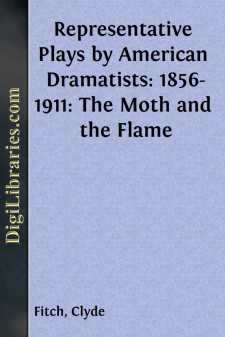Drama
General Books
Sort by:
by:
Bernard Shaw
MISALLIANCE Johnny Tarleton, an ordinary young business man of thirty or less, istaking his weekly Friday to Tuesday in the house of his father, JohnTarleton, who has made a great deal of money out of Tarleton'sUnderwear. The house is in Surrey, on the slope of Hindhead; andJohnny, reclining, novel in hand, in a swinging chair with a littleawning above it, is enshrined in a spacious half...
more...
by:
Clyde Fitch
CLYDE FITCH (1865-1909) Clyde Fitch brought a vivacity to the American stage that no other American playwright has thus far succeeded in emulating. The total impression of his work leads one to believe that he also brought to the American stage a style which was at the same time literary and distinctly his own. His personality was interesting and lovable, quickly responsive to a variety of human...
more...
IN THE SHADOW OF THE GLEN A PLAY IN ONE ACT SCENE.—{The last cottage at the head of a long glen in County Wicklow. Cottage kitchen; turf fire on the right; a bed near it against the wall with a body lying on it covered with a sheet. A door is at the other end of the room, with a low table near it, and stools, or wooden chairs. There are a couple of glasses on the table, and a bottle of whisky, as if...
more...
by:
Oliver Goldsmith
Excuse me, sirs, I pray—I can't yet speak—I'm crying now—and have been all the week."'Tis not alone this mourning suit," good masters:"I've that within"—for which there are no plasters!Pray, would you know the reason why I'm crying?The Comic Muse, long sick, is now a-dying!And if she goes, my tears will never stop;For as a player, I can't squeeze...
more...
by:
Edith Oland
August Strindberg died at Stockholm On May 14, 1912, just ten days after the first of his plays given in English in the United States had completed a month's engagement. This play was "The Father," which, on April 9, 1912, was produced at the Berkeley Theatre in New York, the same little theatre that witnessed in 1894 the first performance in this country of Ibsen's "Ghosts."...
more...
by:
Bernard Shaw
The forenoon of the first of April, 1911. General Mitchener is at his writing table in the War Office, opening letters. On his left is the fireplace, with a fire burning. On his right, against the opposite wall is a standing desk with an office stool. The door is in the wall behind him, half way between the table and the desk. The table is not quite in the middle of the room: it is nearer to the...
more...
by:
Edith Oland
BIOGRAPHICAL NOTE "I tell you, you must have chaos in you, if you would givebirth to a dancing star."—Nietzsche. In Stockholm, living almost as a recluse, August Strindberg is dreaming life away. The dancing stars, sprung from the chaos of his being, shine with an ever-increasing refulgence from the high-arched dome of dramatic literature, but he no longer adds to their number. The...
more...
PEOPLE IN THE PLAY ALICE GARDNER: Daughter of James K. Gardner, President of the L.I. & W. Railroad "UNCLE" JOSEPH HATCH: Alias "Gentleman Joe" "BRICK" MEAKIN: Alias "Reddy, the Kid" HARRY HAYES: Alias "Grand Stand" Harry CAPTAIN LUCAS: Chief of Police Policemen, Brakemen, Engineers Scene—The dining room in the country house of James K. Gardner on Long...
more...
by:
Gunnar Ollen
INTRODUCTION Strindberg's great trilogy The Road to Damascus presents many mysteries to the uninitiated. Its peculiar changes of mood, its gallery of half unreal characters, its bizarre episodes combine to make it a bewilderingly rich but rather 'difficult' work. It cannot be recommended to the lover of light drama or the seeker of momentary distraction. The Road to Damascus does not...
more...
SCENE I. MILLER—MRS. MILLER. MILLER (walking quickly up and down the room). Once for all! The affair is becoming serious. My daughter and the baron will soon be the town-talk—my house lose its character—the president will get wind of it, and—the short and long of the matter is, I'll show the younker the door. MRS MILLER. You did not entice him to your house—did not thrust your daughter...
more...











